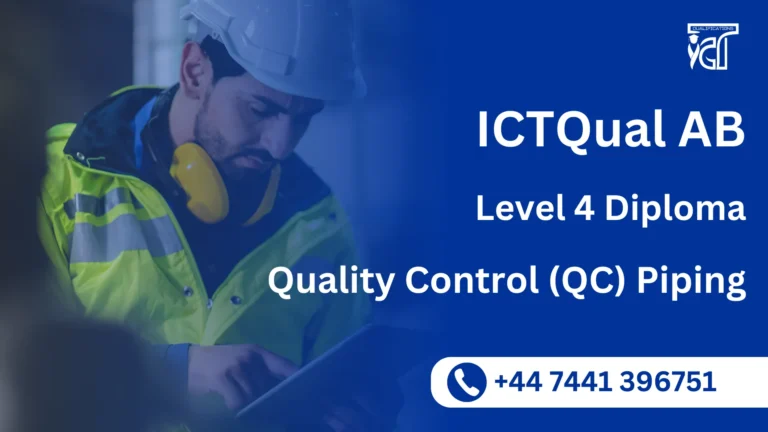In any workplace or environment, fire safety is critical to protecting both people and property. The ICTQual Level 3 Certificate in Importance of Fire Safety is a comprehensive qualification that provides advanced knowledge and skills in fire prevention, risk management, and emergency preparedness. This Ofqual-regulated course equips professionals with the expertise to implement effective fire safety measures, ensuring a safer environment in the workplace or public spaces.
Whether you’re a health and safety officer, a fire safety coordinator, or someone looking to expand their fire safety skills, the ICTQual Level 3 Certificate offers valuable insights and practical knowledge that can be immediately applied.
The ICTQual Level 3 Certificate in Importance of Fire Safety is designed for individuals who are responsible for managing or overseeing fire safety protocols within their organization. This qualification focuses on providing an in-depth understanding of fire risks, fire prevention strategies, fire protection systems, and the legislative requirements necessary to ensure fire safety compliance.
Delivered in a flexible, assignment-based format, the course allows learners to gain hands-on, practical experience in fire safety without the pressure of formal exams. It is Ofqual-regulated, ensuring that the qualification meets high educational standards and is recognized globally by employers across various industries.
This qualification is regulated by Ofqual, ensuring that it adheres to the highest educational standards and is recognized worldwide by employers.The course provides practical, real-world knowledge that can be directly applied to fire safety roles and responsibilities. It’s ideal for professionals working in risk management, facilities management, and health and safety.
The ICTQual Level 3 Certificate in Importance of Fire Safety is an essential qualification for those responsible for managing fire risks, ensuring compliance, and promoting fire safety in the workplace. With a focus on practical application and a strong understanding of fire safety legislation, this course equips learners with the skills needed to manage fire risks and improve safety in any environment.
By completing this qualification, you demonstrate your commitment to maintaining a safe environment and enhancing your career prospects in the fire safety and health and safety sectors.
ICTQual Level 3 Certificate in Importance of Fire Safety
The ICTQual Level 3 Certificate in Importance of Fire Safety qualification consists of 7 units for the completed qualification.
- Advanced Fire Safety Risk Assessment and Hazard Control
- Fire Science: Causes, Spread, and Suppression Techniques
- Legal Frameworks and Regulatory Compliance in Fire Safety
- Designing Effective Fire Prevention and Protection Systems
- Crisis Management and Emergency Response Planning
- Training, Leadership, and Communication in Fire Safety
- Post-Incident Recovery and Fire Safety Improvements
GLH (Guided Learning Hours) and TQT (Total Qualification Time) are terms commonly used in vocational qualifications to help define the amount of time a learner is expected to spend on their studies.
1. GLH (Guided Learning Hours)
GLH refers to the number of hours a learner spends being directly taught, supervised, or supported during their course. This includes the time spent in activities such as:
- Classroom instruction
- Practical workshops
- One-on-one tutoring or mentoring sessions
- Online learning sessions with tutor support
In other words, GLH represents the time that learners are actively engaged with their instructors or learning activities.
2. TQT (Total Qualification Time)
TQT represents the total amount of time a learner is expected to invest in completing a qualification, including:
- GLH (Guided Learning Hours): Time spent on direct learning, as explained above.
- Self-Directed Learning: This includes time spent on independent study, research, assignment completion, preparation for exams, and any other work the learner does outside of direct teaching hours.
TQT is a broader measure that includes all the time required to achieve the qualification. It helps learners and employers understand the overall commitment required for the qualification.
Key Differences Between GLH and TQT:
- GLH focuses on direct learning with guidance or supervision.
- TQT includes GLH as well as independent study time and other learning-related activities.
Example:
If a qualification has a TQT of 600 hours and a GLH of 250 hours, it means the learner should spend 250 hours in direct learning (classroom, online, or tutor-led sessions) and 350 hours on independent study or research.
Here are the learning outcomes for each study unit:
Advanced Fire Safety Risk Assessment and Hazard Control
- Conduct comprehensive fire risk assessments.
- Develop strategies for controlling fire hazards effectively.
Fire Science: Causes, Spread, and Suppression Techniques
- Understand the science behind fire behaviour and causes.
- Learn about modern fire suppression technologies.
Legal Frameworks and Regulatory Compliance in Fire Safety
- Identify key fire safety laws and compliance requirements.
- Understand how to implement compliance measures in workplaces.
Designing Effective Fire Prevention and Protection Systems
- Learn how to design fire prevention systems for various settings.
- Understand different types of fire protection measures.
Crisis Management and Emergency Response Planning
- Develop advanced crisis management strategies for fire emergencies.
- Learn how to coordinate emergency responses effectively.
Training, Leadership, and Communication in Fire Safety
- Understand the importance of leadership in fire safety.
- Learn how to conduct fire safety training and improve communication.
Post-Incident Recovery and Fire Safety Improvements
- Learn how to evaluate fire incidents for future improvements.
- Understand steps for post-fire recovery and rebuilding safety measures.
The ICTQual Level 3 Certificate in Importance of Fire Safety offers a range of benefits for individuals looking to enhance their knowledge and skills in fire safety. Here are some key benefits of this course:
1. Comprehensive Understanding of Fire Safety
- This course provides a thorough understanding of fire safety principles, including how fires start, spread, and how to prevent them in different environments.
- Learners will gain insights into fire prevention, detection, and emergency procedures that can save lives and protect property.
2. Career Advancement
- Completing this certificate can improve your professional qualifications, making you more competitive in industries where fire safety is a priority (e.g., construction, healthcare, manufacturing, and hospitality).
- The course is ideal for those aiming for roles such as fire safety officers, health and safety managers, or building supervisors.
3. Enhanced Workplace Safety
- Understanding fire safety laws and regulations helps organizations meet legal requirements, reducing the risk of fines and penalties.
- It equips employees to recognize fire hazards and take proactive steps to mitigate risks, which leads to a safer working environment.
4. Increased Confidence in Emergency Situations
- Learners will be prepared to handle fire emergencies efficiently, knowing the appropriate steps to take during evacuation and how to use fire safety equipment effectively.
- This knowledge builds confidence in the ability to act under pressure, which is critical in emergency situations.
5. Practical Fire Safety Skills
- The course teaches practical skills such as conducting fire risk assessments, developing fire safety plans, and understanding evacuation protocols.
- Learners will also be trained in the proper use of fire extinguishers, fire alarms, and emergency exits.
6. Promotes a Culture of Safety
- By fostering awareness and understanding of fire safety, the course helps create a culture of safety within organizations.
- Employees will be more likely to take personal responsibility for maintaining fire safety standards, benefiting the overall safety culture.
7. Qualification Recognized by Employers
- The ICTQual Level 3 Certificate is a widely recognized and respected qualification, ensuring that employers value the knowledge and skills gained.
- The certification can help individuals stand out when applying for jobs in safety-related fields.
8. Flexibility in Learning
- Many courses offer flexible learning options, allowing students to complete the training at their own pace or through online platforms, making it accessible to a wide range of individuals.
9. Essential for Compliance with Fire Safety Legislation
- With increasing fire safety regulations, this course helps professionals and organizations meet the standards set out by fire safety laws, such as the Regulatory Reform (Fire Safety) Order 2005.
10. Cost-Effective Risk Reduction
- By preventing fire incidents and minimizing the damage caused, the course can save organizations significant costs in terms of property damage, insurance premiums, and potential legal liabilities.
Overall, the ICTQual Level 3 Certificate in Importance of Fire Safety is a valuable qualification for anyone seeking to improve fire safety knowledge and contribute to a safer workplace or environment.
The ICTQual Level 3 Certificate in Importance of Fire Safety is best suited for a variety of professionals and individuals who want to enhance their fire safety knowledge and skills. Here’s a breakdown of the best candidates for this course:
1. Health and Safety Professionals
- Who They Are: Individuals responsible for ensuring the health and safety of workers in various industries, including construction, manufacturing, healthcare, and retail.
- Why It’s a Good Fit: This course will deepen their understanding of fire safety regulations, risk assessment, and emergency procedures, enabling them to enhance the safety standards in their organizations.
2. Facilities Managers
- Who They Are: Professionals managing the maintenance and safety of buildings, workplaces, and public spaces.
- Why It’s a Good Fit: Facilities managers will benefit from learning fire safety practices, evacuation planning, and how to ensure the building complies with fire safety regulations, improving overall safety for employees and visitors.
3. Building Managers and Supervisors
- Who They Are: Individuals overseeing the management and operation of buildings, including offices, schools, hospitals, and public venues.
- Why It’s a Good Fit: This course equips building managers with the knowledge to implement fire safety measures, conduct fire risk assessments, and create emergency evacuation plans, ensuring the safety of tenants and visitors.
4. Security Personnel
- Who They Are: Security officers working in various settings, such as office buildings, factories, malls, and public institutions.
- Why It’s a Good Fit: Security personnel can gain the skills to respond effectively during a fire emergency, understand fire prevention measures, and assist in evacuations, all of which are critical to their roles.
5. HR Managers and Supervisors
- Who They Are: Human Resources professionals overseeing employee safety and workplace well-being.
- Why It’s a Good Fit: This course will provide HR managers with the knowledge to help create and maintain safe working environments, manage fire drills, and ensure that all safety protocols are in place for the workforce.
6. Construction Workers and Site Managers
- Who They Are: Individuals working in construction or managing construction projects where fire safety risks are a concern.
- Why It’s a Good Fit: The course provides vital fire safety knowledge relevant to construction environments, including fire hazards, prevention strategies, and emergency procedures on construction sites.
7. Small Business Owners and Managers
- Who They Are: Entrepreneurs or managers of small businesses, including retail stores, restaurants, and offices.
- Why It’s a Good Fit: Small business owners and managers can benefit from understanding fire safety regulations, conducting fire risk assessments, and ensuring their premises are compliant with fire safety laws to protect employees and customers.
8. Employees in High-Risk Environments
- Who They Are: Workers in sectors like hospitality, healthcare, manufacturing, or any industry where fire hazards are prevalent.
- Why It’s a Good Fit: Employees in these industries will learn how to identify fire risks and contribute to preventing accidents, ensuring a safer environment for themselves and their colleagues.
9. Aspiring Fire Safety Officers
- Who They Are: Individuals looking to build a career in fire safety and emergency management.
- Why It’s a Good Fit: This course provides a strong foundation for those wishing to enter the fire safety field by equipping them with essential knowledge and practical skills related to fire prevention and emergency response.
10. Anyone Interested in Improving Personal Safety Knowledge
- Who They Are: Individuals seeking to improve their personal fire safety awareness, such as homeowners or community volunteers.
- Why It’s a Good Fit: This course provides crucial information about preventing fires, using fire safety equipment, and handling fire-related emergencies, benefiting anyone who wants to ensure their own and their family’s safety.
In summary, this course is ideal for professionals and individuals in roles where fire safety is important, offering valuable knowledge and skills to promote a safer environment and meet regulatory standards.
Entry Requirements
Register Now
Qualification Process
Qualification Process for the ICTQual Level 3 Certificate in Importance of Fire Safety
- Self-Assessment:
Begin by evaluating your eligibility to ensure you meet the qualification requirements, including work experience, knowledge, and language proficiency. - Registration:
Complete your registration by submitting the required documents, including a scanned copy of a valid ID, and paying the registration fee. - Induction:
An assessor will conduct an induction to confirm your eligibility for the course and explain the evidence requirements. If you do not meet the criteria, your registration will be canceled, and the fee will be refunded. - Assignmnets & Evidence Submission:
Provide all assignmnets and the necessary evidence based on the assessment criteria outlined in the course. If you are unsure of the required evidence, consult with the assessor for guidance on the type and nature of evidence needed. - Feedback and Revision:
The assessor will review your submitted evidence and provide feedback. Evidence that meets the criteria will be marked as “Criteria Met,” while any gaps will be identified. You will be asked to revise and resubmit if needed. - Competence Evidence:
Submit final evidence demonstrating that all learning outcomes have been met. This evidence will be marked as “Criteria Met” by the assessor once it is satisfactory. - Internal Quality Assurance (IQA):
The Internal Quality Assurance Verifier (IQA) will review your evidence to ensure consistency, quality, and compliance with standards. - External Verification:
The IQA will submit your portfolio to ICTQUAL AB External Quality Assurance Verifiers (EQA) for final confirmation. The EQA may contact you directly to verify the authenticity of your evidence. - Certification:
Upon successful completion of all checks, ICTQUAL AB will issue your official certificate, confirming that you have attained the ICTQual Level 3 Certificate in Importance of Fire Safety.







